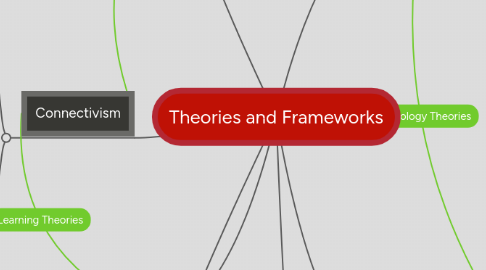
1. Constructivism
1.1. Basic Principles
1.1.1. Learning is constructed
1.1.2. Learners build new knowledge upon the foundation of previous learning.
1.1.3. Understanding can change to accommodate new experience.
1.2. Implications for Education
1.2.1. Emphasizes authentic, challenging projects.
1.2.2. Learners assume the responsibilities of their own learning.
1.2.3. Helps students engage in real world problem solving.
2. Connectivism
2.1. Basic Principles
2.1.1. Learning is a process of connecting specialized nodes of information
2.1.2. Capacity to know more is more critical than what is currently known. (The pipe is more important than the content within the pipe.)
2.2. Implications for Education
2.2.1. Informal learning is significant. Formal education is no longer the majority of our learning.
2.2.2. Learning occurs through communities of practice, personal networks, and through completion of work-related tasks.
3. Cognitive Load
3.1. Basic Principles
3.1.1. Two types of memory.
3.1.1.1. Long-term memory is vast and can hold complex data.
3.1.1.1.1. It holds information in schemas.
3.1.1.2. Working memory has a finite capacity.
3.2. Implications for Education
3.2.1. Knolwledge Compression (chunking)
3.2.2. Repetition needed for complex tasks.
3.2.3. Provide meaningful information contexts.
3.2.4. Do not overload students with information.
4. TPACK
4.1. Basic Principles
4.1.1. Interplay of 3 primary forms of knowledge
4.1.1.1. CK
4.1.1.2. PK
4.1.1.3. TK
4.1.2. Emphasizes new kinds of knowledge
4.1.2.1. This lies @ the intersection of CK, PK, + TK
4.2. Elements
4.2.1. Content Knowledge (CK)
4.2.2. Pedagogical Knowledge (PK)
4.2.3. Technological Content Knowledge (TK)
4.2.4. Technological Content Knowledge (TCK)
4.2.5. Pedagogical Content Knowledge (PCK)
4.2.6. Technological Pedagogical Knowledge (TPK)
5. Media Ecology
5.1. Basic Principles
5.1.1. The study of media as environments and the study of environments as media ecology.
5.1.2. Technology and techniques, modes of information and codes of communication play a leading role in our lives.
5.2. Implications for Education
5.2.1. Tries to find out how media structure what students are seeing.
5.2.2. Tries to find out why media make students feel and act the way they do.
6. SCOT
6.1. Basic Principles
6.1.1. Technology doesn't determine human action, but rather, human action shapes technology.
6.1.2. In order to understand how technology is used, we need to understand how that technology is embedded in its social context.
6.1.3. Not only a theory, but also a methodology.
6.2. Implications for Education
6.2.1. There are formal steps and principles to follow in order to analyze the causes of technological failures or successes.
7. Philosophy of Teachnology
7.1. Basic Principles
7.1.1. You need to reflect on your current teaching practices + think about how you should include technology in these practices.
7.2. Elements
7.2.1. Your philosophy of teaching
7.2.2. Your belief about the use of technology in teaching.
